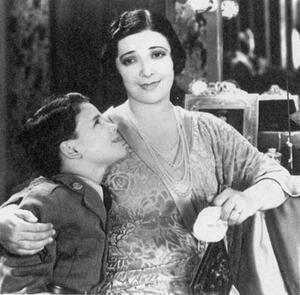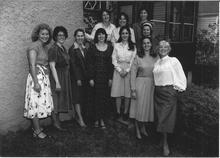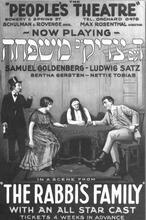Belle Baker
Belle Baker’s resonant voice made her the first choice of many composers to debut their songs, and she helped to introduce 163 songs to the public throughout her career on stage and in recordings. At fourteen Baker was earning three dollars a week at the People’s Music Hall, where she was discovered by Jacob P. Adler, who hired her to sing between acts. She performed in nightclubs, Yiddish theater, and the Ziegfeld Follies. In 1935, she toured England, singing in music halls and dancing with the Prince of Wales. She introduced Irving Berlin’s “International Rag” to audiences, and debuted his “Blue Skies” in 1926. She belonged to several charitable organizations and served on the council of the American Federation of Actors and the Jewish Theatrical Guild of America.
Belle Baker has been described as a famed torch singer and vaudeville star, as well as a Yiddish, Broadway, and motion picture actor. Among the songs associated with her are “Eli Eli” and “My Yiddishe Mama.” Her style combined the warmth and tender lament of the Yiddish folk song with the modern jazz lyric.
Early Life
Belle Baker was born in New York City, most likely on December 25, 1893, to Hyman and Sarah Becker. She was one of six children. At age eight she was singing for pennies on the street and sold flowers and newspapers. She was educated in public schools, which she left at age nine to make a living in a dress factory.
Performance Career
The stage was her goal. In 1910, she earned three dollars a week at the People's Music Hall. Jacob P. Adler, the famous Yiddish actor, heard her, and he hired her to play the part of a boy in his drama The Homeless and to sing songs between acts. She sang in the Lower East Side music halls and nightclubs. She later played the Yiddish theater and toured the United States many times.
Baker had a deep, resonant voice and achieved stardom at age twenty when she played the Palace Theatre, sharing the program with Sarah Bernhardt. She performed in the Hammerstein musical Victoria and in 1926 in Rodgers and Hart’s musical Betsy. She appeared in several editions of the Ziegfeld Follies. In 1933, she performed on radio for the Columbia Network and played music halls in England in 1935, where she danced with the Prince of Wales.
Baker helped to introduce 163 songs to the public, including “Blue Skies,” “All of Me,” “Cohen Owes Me $97,” and Irving Berlin’s “International Rag” and “Alexander’s Ragtime Band.” A short, dark, plump woman, she made Song of Love, a movie released in 1929. Her last official appearance in public was on the television show This Is Your Life in 1955.
Baker was a member of the Deborah Jewish Consumptive Relief Society, Hebrew Convalescent Home, Hebrew Home of the Aged of Harlem, Home of the Daughters of Jacob, Jewish Consumptive Relief Society (Denver), Beth Abraham Home for Incurables, Hebrew Orphan Home, and Temple Beth El (Belle Harbor, Long Island), and served on the council of the American Federation of Actors and the Jewish Theatrical Guild of America.
Personal Life and Legacy
She was married three times. She married Lou Leslie, a vaudeville actor, in 1913; the marriage ended in divorce in 1919. She then married Maurice Abrahams, a songwriter, on February 16, 1920. They had one son, Herbert Joseph Baker, who became a television and film scriptwriter. He adopted his mother’s maiden name for his professional career. Maurice Abrahams died in 1931. Her third marriage, on September 21, 1937, to Elias E. Sugarman, editor of Billboard, ended in divorce in 1941.
Belle Baker lived most of her life in New York, spending her last years in Beverly Hills, California. She suffered a heart attack in her Beverly Hills home on April 28, 1957, and died shortly thereafter in Cedars of Lebanon Hospital at age sixty-two. She was survived by her son, two brothers, and three sisters.
AJYB 24:116, 59:474.
Belle Baker and Marilyn Cooper collection, 1912-1970, Billy Rose Theatre Collection, New York Public Library.
Lifson, David S. The Yiddish Theatre in America (1965).
Mock, Roberta. “Female Jewish Comedians: Grotesque Mimesis and Transgressing Stereotypes.” New Theatre Quarterly 15, no. 2 (1999): 99-108.
Obituary. NYTimes, April 30, 1957, 29:1.
UJE.
WWIAJ (1926, 1928, 1938).






